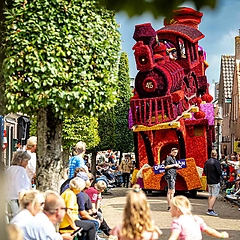On Fair Monday everyone celebrates in Nieuw-Vossemeer. Early in the morning the inhabitants of this village in Brabant assemble in one of the two cafés for the Fair Breakfast. Then the prize-dancing starts: a dance competition for couples, with five cones on the floor or hanging from the ceiling, in a random setup. Three or four couples dance at the same time, but every couple must perform another dance. Usually these are the foxtrot, the jive and a waltz. While dancing they may not touch each other or the cones. The two bars each have their own jury of three. One of the jury members watches the dance itself, one counts the number of cones that are knocked down or touched while dancing and the third looks if the couples stay within the outlines of the dance floor. When the match in the first café is over, the couples and all the spectators move to the next café. Quite a lot of alcohol may be consumed, making it harder and harder to avoid knocking down cones and touching other couples. By the end of the day the results are revealed and the prizes awarded to the winning couples. Often various kinds of sausages can be won. The sausage is cut immediately and distributed amongst those present.



